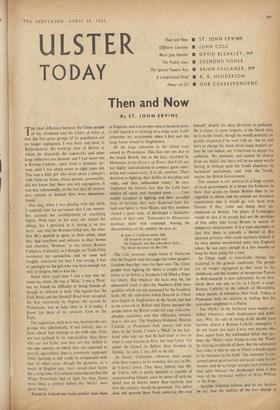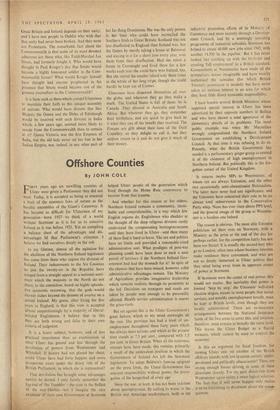ULSTER
TO DAY
Then and Now Offshore Counties More Jobs Needed The Proddy Boys The Special Powers Acts A Complicated Brief Power via Oil • ST. JOHN ERVINE III JOHN COLE • DAVID BLEAKLEY, MP 111 DESMOND FISHER IR BRIAN FAULKNER, MP IIII R. B. HENDERSON • OUR CORRESPONDENT
Then and Now
By ST. JOHN ERVINE
rrtiE chief difference between the Ulster people I of my childhood and the Ulster of today is that the two great groups of its population are no longer segregated. I was born and bred in Ballymacarett, the working class of Belfast in which the shipyards, the ropeworks and other large industries are situated, and I had never met a Roman Catholic, apart from a domestic ser- vant, until I was about seven or eight years old. This was a little girl who lived about a minute's walk from my home, whose parents, presumably, did not know that there was any segregation. It was due, substantially, to the fact that all elemen- tary schools in Ireland then were denomina- tional.
One day, when I was playing with this child, I suddenly and for no reason that I can remem- ber, accused her co-religionists of crucifying Christ. With tears in her eyes, she denied the charge, but I persisted in it, basing it on two facts: one, that the Romans killed him, the other that RCs seemed to glory in their crime, since they had crucifixes and calvarys in their homes and churches. 'Romans,' to me. meant Roman Catholics. Unluckily, as I thought, my Uncle John overheard my accusation, and he soon and roughly convinced me that 1 was wrong. I had to apologise to the girl who was kind enough not only to forgive, but to kiss me.
About three years later I met a boy who be- came my chum. He was a 'Mick,' I was a 'Prod,' but we found no difficulty in being friends al- though we differed in faith. The legend that the Falls Road and the Shankill Road were occupied, the first exclusively by Papists, the second by Protestants, was as false then as it is today. I. know, for three of my relatives lived on the Falls.
The separation, such as it was, between the two groups was substantially, if not entirely, due to facts which had nothing to do with sect. Celts are less inclined to be industrialists than those who are not Celts; and they are less skilled in the one industry in which they are supposed to prevail, agriculture, than is commonly supposed. Their farming is still crude in comparison with that of other races, though the peasants, as a result of English rule, have owned their farms for a long time. It is seldom remembered, that the Ulster Protestants had to fight for their farms more than a century before the Wicks' were given theirs.
Farms, in Ireland arc much smaller than those in England, and a man who owns a hundred acres still regarded as farming on a large scale. I still remember my amazement when I first saw the large farms owned by Englishmen.
All the large industries in the island were owned by Protestants. This fact was not due to the brutal British, but to the fact. recorded by Mommsen in his History of Rome, that Celts are too highly individualised to conduct great enter- prises and cannot easily, if at all, combine. 'Their devotion to fighting, their dislike of discipline and order, and their unbounded vanity,' he says, 'explained the historic fact that the Celts have shaken all states and founded none. . . . Con- stantly occupied in fighting and their so-called feats of heroism, they were dispersed from Ire- land and Spain to Asia Minor; and they nowhere created a great state, or developed a distinctive culture of their own.' Tennyson's In Memoriam dismisses them with contempt. Among the characteristics of his country, he says, is: A love of freedom rarely felt, Of freedom in her regal seat Of England; not the schoolboy heat, The blind hysterics of the Celt.
The Celt, however, might retort to Tennyson that the English were less eager for other people's freedom than they were for their own. The Ulster people were fighting for theirs a couple of cen- turies or so before a Southern Celt lifted a finger for liberty. But whatever the facts may be. the substantial truth is that the Northern Irish have qualities which are not possessed by the Southern Irish. All the industries which flourish in Ulster were begun by Englishmen in the South. but had to be removed to Belfast and Derry because the people below the Boyne could not cope with com- plicated machines; and that difference remains true to this day. The Northern Irishman. Roman Catholic or Protestant, feels uneasy and even alien in the South. I knew a 'Mick' in my boy- hood who told me that he had tried to live in what is now known as Eire. but had failed. 'I'd rather be kicked in Belfast than fondled in Dublin,' he said. I, too, felt as he did.
In theory, Ulstermen, whatever their creed, wish their country to be reunited, but not on Mr. de Valera's terms. They deny, indeed, that Mr. de Valera, who is partly Spanish, is capable of understanding Ireland, since he starts off with the belief that he knows better than 'anybody else how the country should be governed. This defect does not prevent them from admiring the man himself, despite his deep devotion to pedantry. He is cioser, in some respects, to the North than he is to the South, though he would probably ,be greatly surprised if he were told so: but he will have to change his mind about many matters be- fore he can induce any Ulsterman to accept his authority. We maintain, and cannot be shaken from our belief, that there will be no union worth having in Ireland until the South abandons its backstreet parliament, and, with the North, rejoins the British Government.
This reunion is not adverse to a large system of local government. It is better for Irishmen to have free access to Great Britain than to be regarded as aliens, and we remind our Southern countrymen that it would go very hard with Eireans if they could not dump their un- employed on Britain. The plight of Connaught would be dire if its people had not the privilege of free entry into Great Britain in search of temporary employment. It is a bare statement of fact that there is scarcely a farmer in that pleasant province who could maintain himself if he were denied unrestricted entry into England where he can earn enough in a few months to keep his farm going for a year.
In Ulster itself. a remarkable change has occurred in the general conditions. The people are no longer segregated as they were in my childhood, and the number of prosperous Papists in Ballymacarett is now substantial. In my boy- hood, there was not. so far as I know, a single Roman Catholic in the suburb of Bloomfield, where people of substance then lived. Today, a Protestant feels no surprise at finding that his next-door neighbour is a Papist.
The Wicks' in my boyhood were mainly un- skilled labourers. small shopkeepers and publi- cans. Why the sale of strong drink should have become almost a Roman Catholic monopoly, I do not know, nor have I ever met anyone who does, apart from the unfounded belief that per- haps the Wicks' were trying to ruin the 'Prods' by making drunkards of them. But the substantial fact today is that no one in Ulster is handicapped in his business by his faith. The customer is con- cerned about good service and good value for his money; and he no longer accepts bad service and bad value because the shopkeeper takes a dim view of the immortal welfare of King William or the Pope.
Sensible Irishmen believe, and do not hesitate to say. that the welfare of the two islands of Great Britain and Ireland depends on their unity; and I have met people in Dublin who wish that that unity had never been broken. And they were not Protestants. The remarkable fact about the Commonwealth is that some of its most devoted adherents are those who, like Field-Marshal Jan Smuts, had formerly fought it. Who would have thought in Paul Kruger's day that Smuts would become a highly honoured soldier in the Com- monwealth forces? What would Kruger himself have thought had anyone prophesied in his presence that Smuts would become one of the greatest counsellors in the Commonwealth?
It is facts such as these which compel Ulstermen w maintain their faith in this unique assembly of nations. Who would have dreamt that Her Majesty the Queen and the Duke of Edinburgh would be received with such fervour in India which, a few years ago, seemed more likely to secede from the Commonwealth than to remain in it? Queen Victoria was the first Empress of India, but the old lady never set her feet in her Indian Empire, nor, indeed, in any other part of her far-flung Dominions. She was the only person in her time who could have reconciled the Southern Irish to Great Britain. Scotland was not less disaffected to England than Ireland was, but the Queen by merely taking a house at Balmoral and staying in it for a short time every year. won them from their disaffection. Had she taken a house in Connaught and lived there for a few weeks each year she could have won Ireland, too. But she visited the smaller island only three times in the whole of her long reign, though she could hardly be kept out of Cannes.
Ulstermen have dispersed themselves all over the globe, and wherever they go they make a mark. The United States is full of them. So is Canada. They abound in Australia and South Africa But wherever they go, they remember their birthplace, and are quick to give back to it what they can of the benefit they received. The Eireans are glib about their love of the Ould Counthry, as they delight to call it. but they seldom return to it and do not give it much of their money.















































 Previous page
Previous page